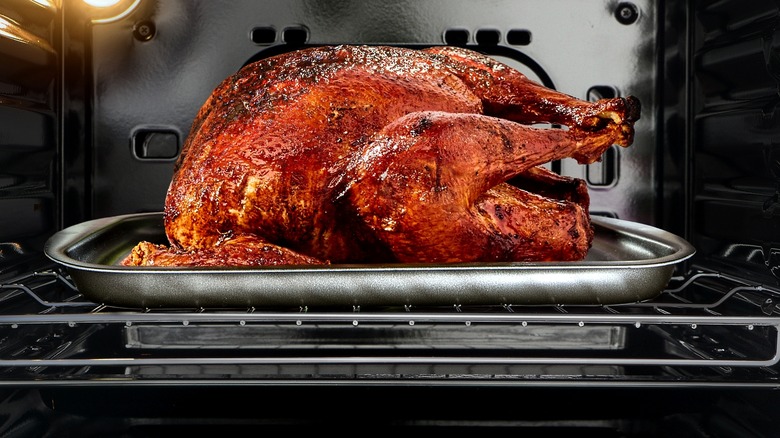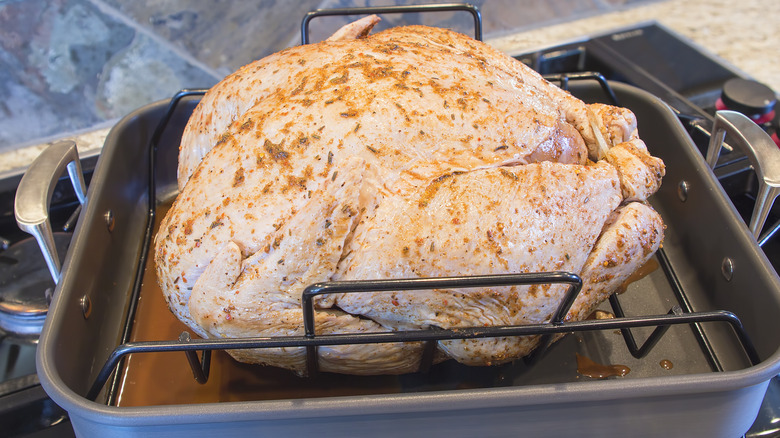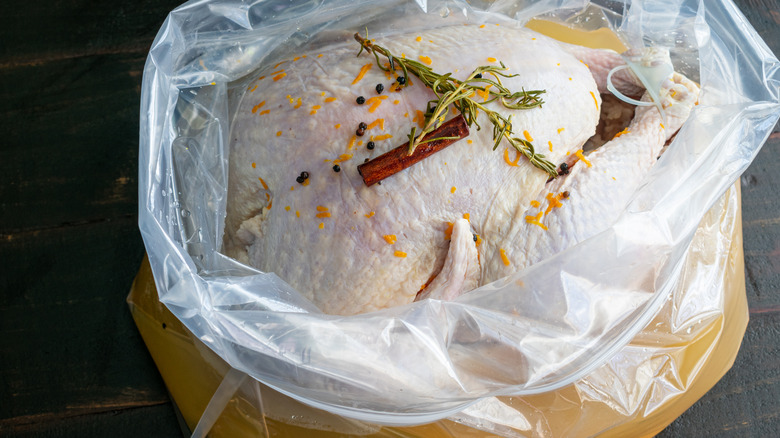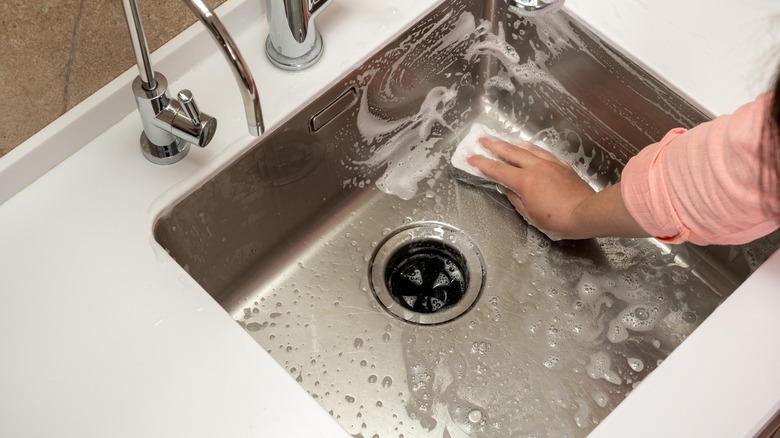Why You Shouldn't Wash Raw Turkey
Whether you celebrate with turkey on Thanksgiving, Christmas, or when your favorite football team wins, no doubt you've had questions about how to prepare it. These questions are usually about whether to roast it upside down or fry it, which may seem trivial, but many aspects of cooking a turkey can turn unsafe if executed incorrectly. The USDA reports that they get an increase in phone calls during turkey season with concerns about salmonella and how to clean their raw turkey. The organization reports that one of the best ways to prevent the spread of bacteria when working with raw poultry is to cook it to a safe internal temperature of 165 degrees, which means you will need a meat thermometer.
Some cooks like to cook it even longer for crispy skin and fall-off-the-bone thighs. This long cooking time may be one of the biggest draws to cooking a turkey – a "throw it in the oven and forget about it” approach. But before people rub down their turkeys with salt and spices, 68% of people wash them first, says the USDA. As it turns out, washing raw poultry is unsanitary and unsafe, and in the end, won't make your roasted turkey any cleaner.
Dry-brined birds don't need a rinse
Cooks wash their produce like apples and potatoes to remove bacteria, so why not raw poultry? Washing poultry is much more dangerous than washing produce because harmful bacteria can spread around your countertop, kitchen sink, cooking utensils, and more from splashing water, per the USDA. Additionally, washing hasn't been proven to remove all bacteria anyway (via University of Illinois).
Even when dry-brining turkey, there is no need to wash it off, writes Epicurious. Dry-brining involves salting the turkey and letting it sit for 12 hours, which tenderizes the meat and helps it retain moisture. The salt draws the moisture out, then it dissolves and the bird reabsorbs the moisture. The result is a plump, juicy bird with crisp skin that guests will go crazy over. If you're worried about moisture on the skin preventing it from browning, just leave it uncovered in the fridge for a few hours and the skin will dry out. Even though you may be tempted to do so, rinsing the turkey to remove excess salt would undo all that brining and risk the skin getting soggy again.
Rinse a wet-brined turkey
Contrary to everything we just said about dry-brining, wet-brining is the only time when you should wash a raw turkey. Wet-brining is when a turkey sits in a salt-bath overnight and soaks in the juices, plumping up even more, explains Epicurious. Amazingly, it can be up to a whole pound heavier after it absorbs all that moisture overnight. One of the pitfalls to a wet brine that you should look out for is having an over-salted bird, so recipes like Pioneer Woman's suggest rinsing thoroughly then soaking it in the sink for 15 minutes. In this case, you are not trying to wash away bacteria, you're simply removing excess salt.
The USDA recommends rinsing a wet-brined bird too, but they have some specific instructions to prevent you from spreading bacteria. The organization recommends first clearing away anything surrounding your sink like utensils, dishes, and other food items. Then, line all surrounding surfaces with paper towels to absorb any splashes. Finally, if you turn your faucet on to a slow stream, this should help prevent water from splashing up and around the sink area.
Clean surfaces with hot soapy water
When your turkey is brined (perhaps rinsed) and happily in the oven, it's time to clean up. A study reported by NPR found that bacteria can fly up to 3 feet away from where your meat is rinsed, so clean up thoroughly. First things first, wash your hands. This is the first place where cross-contamination occurs in any cooking situation, especially if you've been handling raw poultry. The USDA recommends washing your hands for 20 seconds with warm soapy water. For the countertops, faucet, sink and surrounding surfaces (up to 3 feet away), use hot soapy water as well. After disinfecting with hot soapy water, the USDA suggests using a solution of 1 tablespoon of unscented, liquid chlorine bleach (per gallon of water) to sanitize. Let everything dry thoroughly before continuing.
All that being said, when preparing turkey this year, or any raw poultry for that matter, it's best to focus on temperature. CNN reports that "obsessive attention to temperature" is the surest way to keep foodborne pathogens at bay. So arm yourself with a meat thermometer instead of the kitchen faucet this year.



